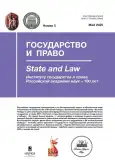On the federal constitutional law governing the appointment of judges: what should our judges be like
- Авторлар: Kleandrov M.I.1
-
Мекемелер:
- Institute of State and Law of the Russian Academy of Sciences
- Шығарылым: № 5 (2025)
- Беттер: 121-134
- Бөлім: Judicial power
- URL: https://journal-vniispk.ru/1026-9452/article/view/306958
- DOI: https://doi.org/10.31857/S1026945225050117
- ID: 306958
Дәйексөз келтіру
Аннотация
The issue of appointing federal judges to their post by the President of the Russian Federation is being considered. Prior to the constitutional innovations of 2020, Part 2 of Art. 128 of the Constitution of the Russian Federation proclaimed that judges of other federal courts (the “other ” refers to the Constitutional and Supreme Courts of the Russian Federation, whose judges, as per Part I of Article 128 of the Constitution of the Russian Federation, are appointed by the Federation Council upon recommendation of the President of the Russian Federation) are appointed by the President of the Russian Federation in the manner, prescribed by the Federal Law. By the Law of the Russian Federation of 14 March 2020 No. 1-FKZ, Part 2 of the Constitution of the Russian Federation was transformed, and now it proclaims that the chairmen, deputy chairmen and judges of other federal courts (again, with the exception of the heads and judges of the Constitutional and Supreme Courts of the Russian Federation) are appointed by the President of the Russian Federation in the manner, prescribed by federal constitutional law. Considering that the existing formal and personal requirements for holding the position of a judge, with some exceptions, are acceptable and after some adjustments can be enshrined in a future federal constitutional law, the author focuses on justifying the need to consolidate the requirements for health (mental and physical) that do not correspond to a judge and a predisposition to the implementation of fair justice.
Авторлар туралы
M. Kleandrov
Institute of State and Law of the Russian Academy of Sciences
Хат алмасуға жауапты Автор.
Email: mklean@igpran.ru
Moscow
Әдебиет тізімі
- Barkhatova E. Yu. Commentary on the Constitution of the Russian Federation: new edition (itemized). 3rd ed., rev. and suppl. M., 2020 (in Russ.).
- Vyshutovich V. Tomorrow is better than today // Ross. gaz. 2025. February 7 (in Russ.).
- Kleandrov M. I. Judicial Corps of Russia: improvement of the formation mechanism. M., 2019 (in Russ.).
- Kleandrov M. I. What is the Ideal Judge model and why is it needed? // Russian judge. 2005. No. 11. Pp. 4–9 (in Russ.).
- Kozlova N. A fake on a court letterhead // Ross. gaz. 2022. April 18 (in Russ.).
- Medvedev Yu. In search of new facets of happiness: Thousands of scientists from 70 countries are launching the largest experiment in the world // Ross. gaz. 2025. January 8 (in Russ.).
- New Russian Encyclopedia / ed. A. D. Nekipelov, V. I. Danilov-Danilyan, V. M. Karev et al.: in 12 vols. M., 2003. Vol. 1. P. 174 (in Russ.).
- Panov S. L. Socio-legal, moral, psychological and medical aspects of entrepreneurial activity related to the functioning of slot machine halls // Law and Politics. 2006. No. 10. P. 132 (in Russ.).
- Panko N. K. Conscience as a necessary condition for assessing evidence in a criminal case // Judicial power and criminal process. 2016. No. 2. Pp. 204–209 (in Russ.).
- Pashentsev D. A. The conceptual role of legal science in the development of legislation: from classical constructions to innovations of postmodern society // Journal of Russian Law. 2024. No. 5 (in Russ.).
- Savenkov A. N. Russia and its sovereign civilizational space in the light of historiography of comparative state science // Historiographic problems and approaches in modern legal research: collection of scientific works of the First International Confe- rence “Historiographic problems and approaches in modern legal research” (Moscow, October 16, 2024) / under general ed. by A. N. Savenkov, V. S. Gorban. M., 2024. P. 19 (in Russ.).
- Sidorkin S. F. Based on his own experience // Qualification collegium of judges: from congress to congress: sat. M., 2016. P. 513 (in Russ.).
- Sysoev I. Themis in VR glasses. A judge in the United States assessed the crime through a virtual reality helmet // Ross. Gaz. – Nedelya. 2025. February 1 (in Russ.).
- Udartsev S. F. Space state: formation, problems and prospects. M., 2024. P. 357 (in Russ.).
- Fedortsev V. Lose a million. Germans become addicted to gambling // Ross. gaz. 2023. June 1 (in Russ.).
- Shelygin K. V. Applicant for the position of judge in the mirror of psychology // Qualification collegiums of judges: yesterday, today, tomorrow: collection of articles. M., 2012. P. 157 (in Russ.).
Қосымша файлдар









